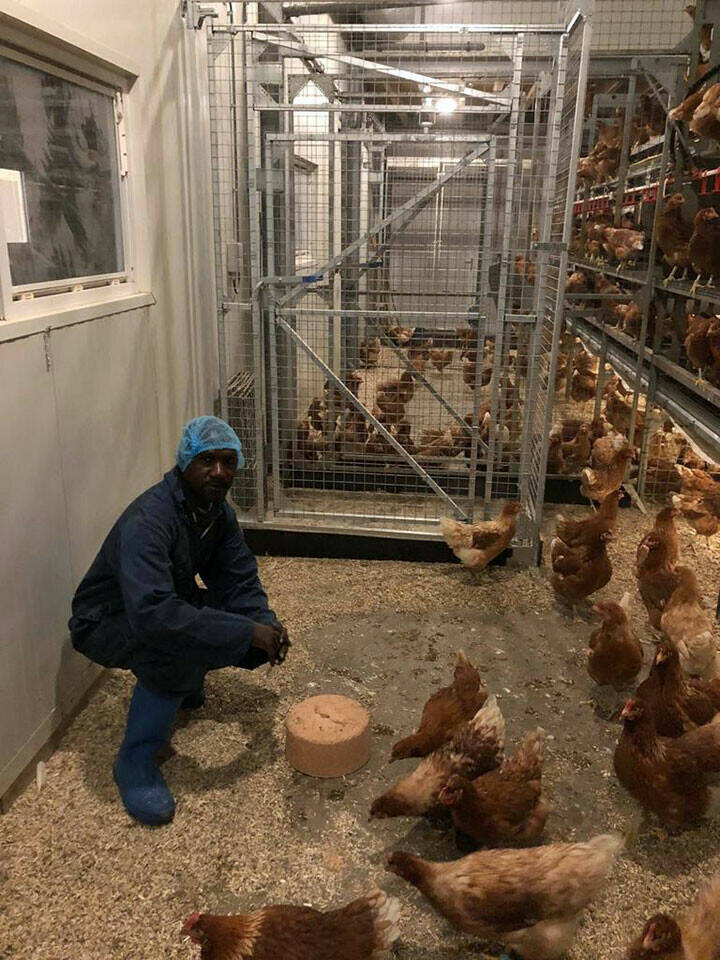

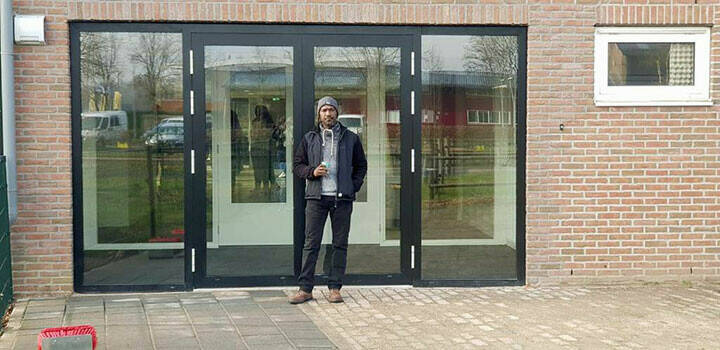
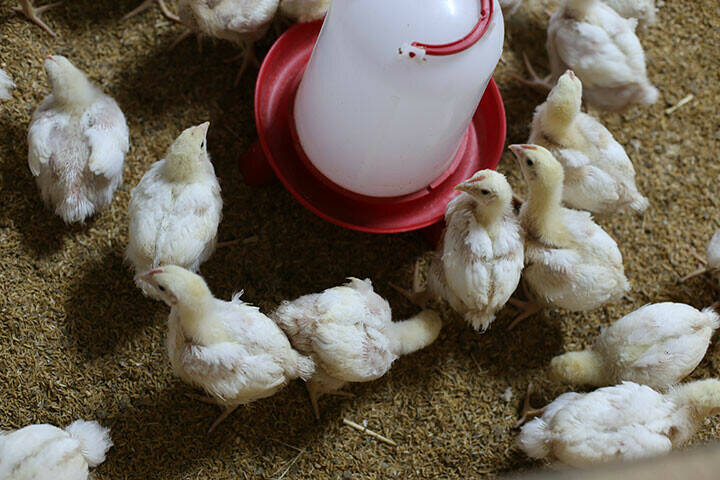
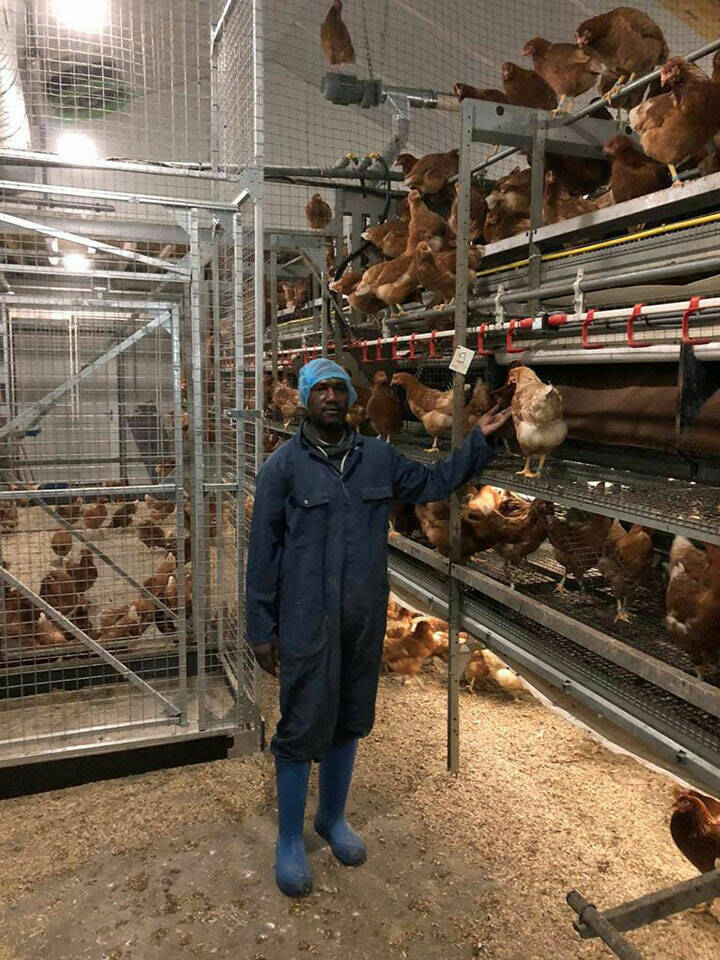
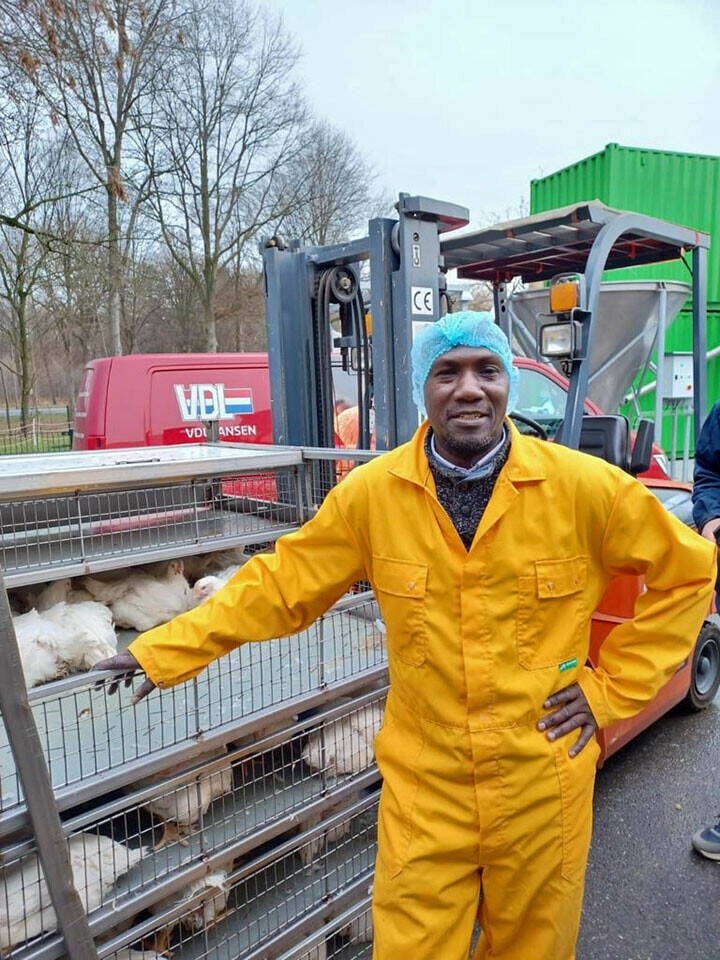
Joackim concludes that he has learned a lot of things. “I would say that my knowledge in poultry production has increased. I have gained new skills and am not the same person that I was when I came here. I have also learned to go out there in the field and practiced what I have retained. I have developed my skills and have improved to come up with solid decisions based on analysis. The emphasis has been on the principle of ‘you look, you think, you make an intelligent decision, and you act’. Only when you look at a situation and think through, you can make a thoughtful decision. I have learned to apply that principle and always take in my surroundings and get a complete view on the situation. What is happening? Why is it happening? What should be different? And how can we arrange that? It is a big lesson for me.”
Upon his return in Zambia, Joackim has made some plans. “The first thing I want to do is transfer the knowledge and skills that I have acquired to my learners and students. I want to apply the principle of learning by doing back home. I have learned that it is not enough to do lectures and simple exercises. Students need to do projects and we need to provide them with ways to apply what they have learned. Secondly, I will be involved in training other staff. My plan is to go and transmit this information to them and share it with them. I believe the whole point of me being here and learning all this, is to go back and transfer this knowledge to others. I hope that by doing that, we can all together improve the poultry production in our country!”
Joackim applied for the course International Poultry Management, that is divided into multiple modules. “It is all about the business part of the farm and altogether the course is so complete and well structured. Examples of the modules are applied poultry management, where we learn about the good practices involved in poultry production. Then there is applied poultry technology, in which we looked into the equipment and technologies that are applied in the business. Another module is poultry farm management, where we learned how to write a bankable business plan and how to develop a business. We learned how to come up with balance sheets and how to organise finances. There is another module that focuses on genetics and breeding, where we learn how to successfully plan to breed all year round. Another lesson that we have learned and that is so valuable to me is the importance of advisory skills. We visited a Dutch farmer and asked him about the challenges that he was facing. We made a plan and went back to him, to give advice on how to go about those challenges. For me this was such a valuable lesson. It equipped me on how to go about advising both groups of farmers and individual farmers, something that I never practiced before and am happy to take home.”
Joackim explains that in every module the students get assigned a project in which they can apply whatever they learned back home. “The trainers conduct their lessons in such a way that we always learn how to implement things back home. We look at the advanced technologies that are available here, but not back home, so we also look at ways that we can practice what we learned back home.”
At Aeres TCI Joackim experienced what it is like to follow education based on the principal of learning by doing. “Whenever we learn something, the teachers incorporate excursions and make sure that we practice what we have learned. Learning by doing is a method of teaching whereby everybody is involved in the process of learning. If you don’t do it, no one else will do it for you. To me it proves to be the most effective method of teaching and therefore this is something that I will implement back home as well.”
Before Joackim applied to Aeres TCI, he did a fair amount of research. “I read about people’s experiences here. They were all very positive and that excited me a lot. When I finally came here, I discovered it truly is a marvellous experience to study here. First and foremost because Aeres TCI is a centre of poultry expertise. I dare to say they are the best. There is a state-of-the-art poultry lab and I feel so privileged to have experienced working there. Second, the classrooms are wonderful. They are all climate controlled, making it comfortable and enjoyable to be there. And another amazing thing is that Aeres has this collection of well-knowledgeable professionals. They are all practically skilled in their own fields of expertise and they are so very dedicated to work. No matter how much questions I asked, they were always eager to help. They include the students and are very approachable.”
Joackim explains that overall, the experience in the classroom was very good. He likes to make one suggestion. “Some students used to speak their mother tongue in class with people from the same country. I feel like maybe banning that and only allowing English as the language inside the classroom would improve the lessons and the adhesion within the classroom. I think it could provide more unity amongst the students.”
Joackim feels at home in The Netherlands. Now that his time here is coming to an end, he likes to reflect on the country. “Cultural differences for example are visible when it comes to food. The Dutch are always drinking coffee”, Joackim smiles when he says it. “In my culture tea is more common. And the Dutch are also crazy about bread and potatoes. Another cultural difference is that the Dutch are very strict in their time management. They are the best keepers of time. Being on time, seems to be very critical. Having stayed here for six months, that is definitely something I am taking home as well.”
What also stood out to Joackim are the way the Dutch keep all sorts of animals as a pet, something that is not very common in Zambia either. “And bicycles, they are everywhere”, he laughs and quickly adds that he himself has a bike in Barneveld and cycles a lot.
Communication wise there are some big differences. “The Dutch are very straightforward. They won’t say no when they mean yes or the other way around. They don’t beat around the bush, which is quite a big contrast with my culture. We use lots of idioms or proverbs and are not always as clear. I find being straightforward a good thing, it is clear communication, and it is also something I will take home.” Beside the differences, Joackim also experienced similarities. “I found the country to be peaceful. The people have a friendly nature, just like they have back home. I also see a lot of respect in the culture. Regardless of age or gender, people are respected. Just on the base that they are human beings. I also experienced that from the teachers, who respect every student and do not look down on them.”
By the time this magazine is published, Joackim is already back home in Zambia. Hopefully, so he says himself, implementing the knowledge he gained during the six months he spent at Aeres TCI. Joackim is a teacher at the Zambia College of Agriculture, where he works as a trainer and practical instructor in animal production.
In September 2022 Joackim started his training at Aeres TCI. “It is my first time being away from home for this long and my first time in the Netherlands, but over the past six months I have felt very welcome here.” Joackim is in Barneveld to study the International Poultry Management course. “I work as a trainer to students and sometimes I directly teach and train farmers. I teach management practices involved in animal production. So, I feel lucky that I got the chance to study this course.”
It was almost ten years ago that Joackim first learned about the possibility to study at Aeres TCI. “A friend who did the course and came back to Zambia and shared his experiences. He was so enthusiastic. Later on, I started checking more details and did my research and finally applied.”
Joackim explains that the people involved with the international programme at Aeres have done a great job of welcoming the students. “I was here during the holidays, for example”, he explains. “And while there were no classes and we had a couple of days off, management had really thought of us. For those staying around campus, they had organised all sorts of things to keep us busy. We were taken to see the dikes, the IJsselmeer. We learned about the water management, got a chance to see the canals and the opening of water gates to see the ships coming in. It was very impressive.”
”
And the Dutch are also crazy about bread and potatoes.
“Friendly people that are madly obsessed about coffee”, is the way Joackim Mambwe, from Zambia, describes the Dutch. At Aeres Training Centre International he recently followed the course International Poultry Management. He shares his experiences at Aeres and tells us what it is like to study here for half a year.
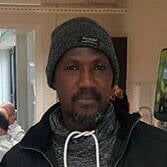
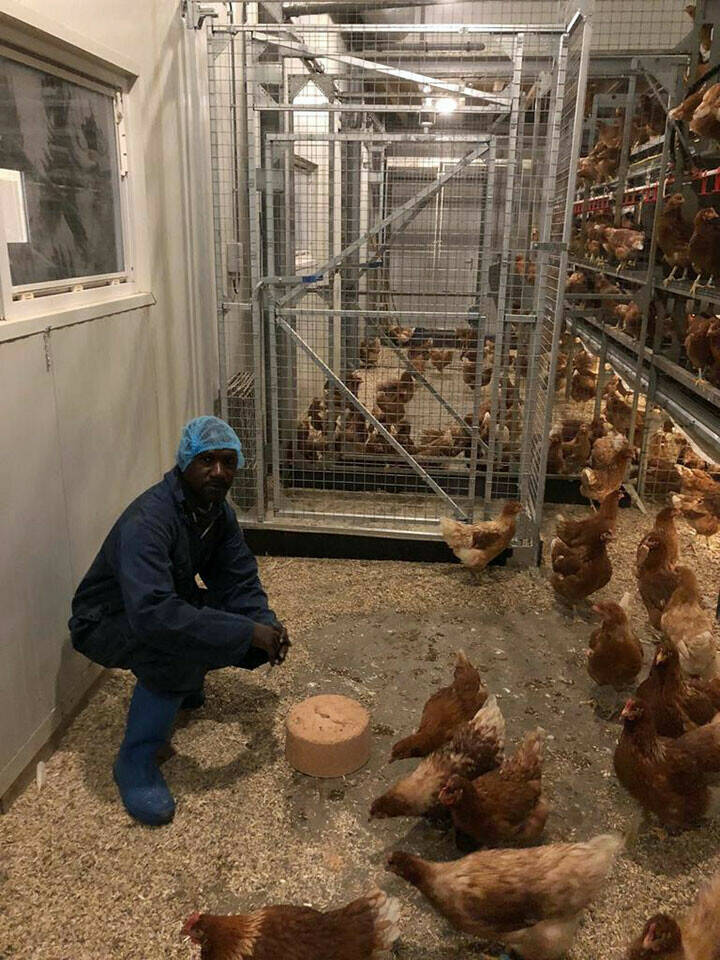
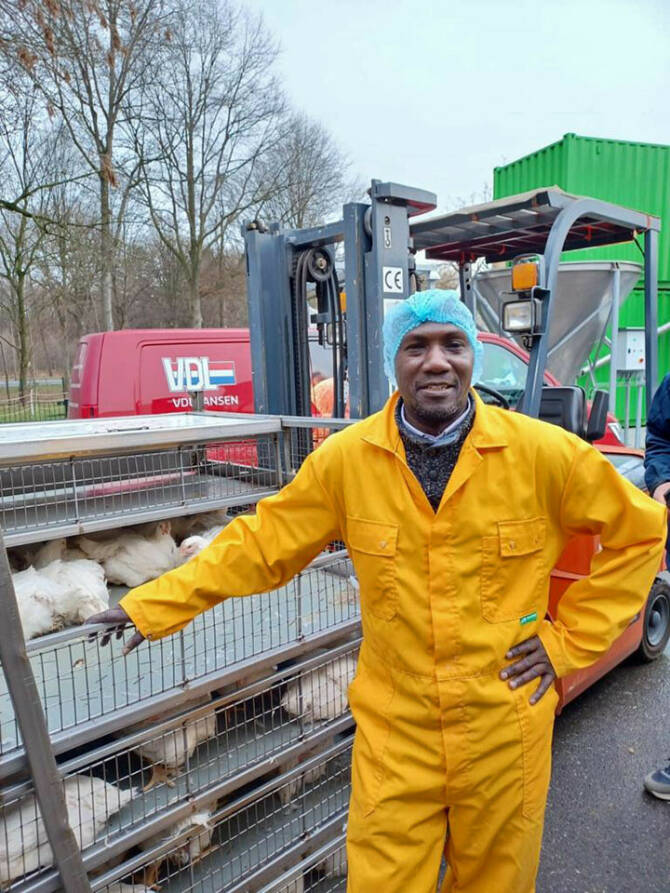
Joackim concludes that he has learned a lot of things. “I would say that my knowledge in poultry production has increased. I have gained new skills and am not the same person that I was when I came here. I have also learned to go out there in the field and practiced what I have retained. I have developed my skills and have improved to come up with solid decisions based on analysis. The emphasis has been on the principle of ‘you look, you think, you make an intelligent decision, and you act’. Only when you look at a situation and think through, you can make a thoughtful decision. I have learned to apply that principle and always take in my surroundings and get a complete view on the situation. What is happening? Why is it happening? What should be different? And how can we arrange that? It is a big lesson for me.”
Upon his return in Zambia, Joackim has made some plans. “The first thing I want to do is transfer the knowledge and skills that I have acquired to my learners and students. I want to apply the principle of learning by doing back home. I have learned that it is not enough to do lectures and simple exercises. Students need to do projects and we need to provide them with ways to apply what they have learned. Secondly, I will be involved in training other staff. My plan is to go and transmit this information to them and share it with them. I believe the whole point of me being here and learning all this, is to go back and transfer this knowledge to others. I hope that by doing that, we can all together improve the poultry production in our country!”

Joackim applied for the course International Poultry Management, that is divided into multiple modules. “It is all about the business part of the farm and altogether the course is so complete and well structured. Examples of the modules are applied poultry management, where we learn about the good practices involved in poultry production. Then there is applied poultry technology, in which we looked into the equipment and technologies that are applied in the business. Another module is poultry farm management, where we learned how to write a bankable business plan and how to develop a business. We learned how to come up with balance sheets and how to organise finances. There is another module that focuses on genetics and breeding, where we learn how to successfully plan to breed all year round. Another lesson that we have learned and that is so valuable to me is the importance of advisory skills. We visited a Dutch farmer and asked him about the challenges that he was facing. We made a plan and went back to him, to give advice on how to go about those challenges. For me this was such a valuable lesson. It equipped me on how to go about advising both groups of farmers and individual farmers, something that I never practiced before and am happy to take home.”
Joackim explains that in every module the students get assigned a project in which they can apply whatever they learned back home. “The trainers conduct their lessons in such a way that we always learn how to implement things back home. We look at the advanced technologies that are available here, but not back home, so we also look at ways that we can practice what we learned back home.”
At Aeres TCI Joackim experienced what it is like to follow education based on the principal of learning by doing. “Whenever we learn something, the teachers incorporate excursions and make sure that we practice what we have learned. Learning by doing is a method of teaching whereby everybody is involved in the process of learning. If you don’t do it, no one else will do it for you. To me it proves to be the most effective method of teaching and therefore this is something that I will implement back home as well.”
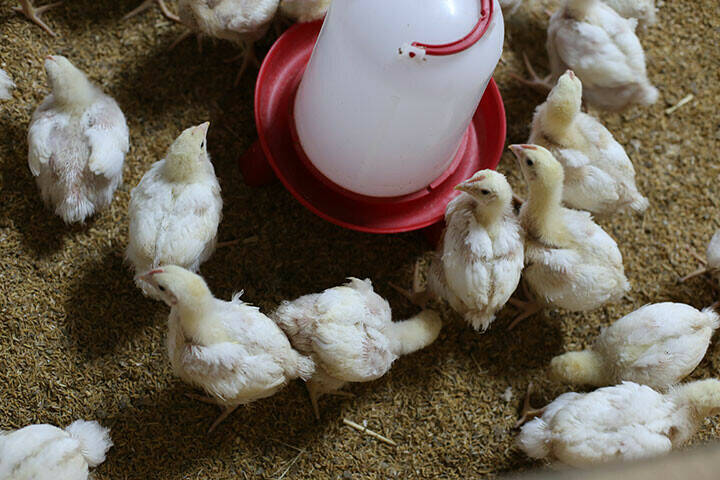
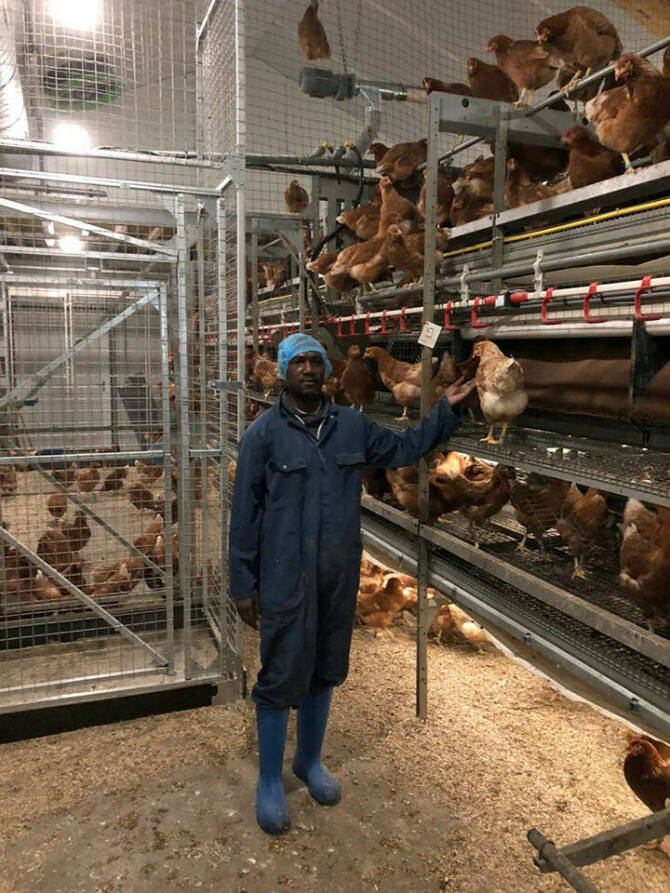
Before Joackim applied to Aeres TCI, he did a fair amount of research. “I read about people’s experiences here. They were all very positive and that excited me a lot. When I finally came here, I discovered it truly is a marvellous experience to study here. First and foremost because Aeres TCI is a centre of poultry expertise. I dare to say they are the best. There is a state-of-the-art poultry lab and I feel so privileged to have experienced working there. Second, the classrooms are wonderful. They are all climate controlled, making it comfortable and enjoyable to be there. And another amazing thing is that Aeres has this collection of well-knowledgeable professionals. They are all practically skilled in their own fields of expertise and they are so very dedicated to work. No matter how much questions I asked, they were always eager to help. They include the students and are very approachable.”
Joackim explains that overall, the experience in the classroom was very good. He likes to make one suggestion. “Some students used to speak their mother tongue in class with people from the same country. I feel like maybe banning that and only allowing English as the language inside the classroom would improve the lessons and the adhesion within the classroom. I think it could provide more unity amongst the students.”
”
And the Dutch are also crazy about bread and potatoes.
Joackim feels at home in The Netherlands. Now that his time here is coming to an end, he likes to reflect on the country. “Cultural differences for example are visible when it comes to food. The Dutch are always drinking coffee”, Joackim smiles when he says it. “In my culture tea is more common. And the Dutch are also crazy about bread and potatoes. Another cultural difference is that the Dutch are very strict in their time management. They are the best keepers of time. Being on time, seems to be very critical. Having stayed here for six months, that is definitely something I am taking home as well.”
What also stood out to Joackim are the way the Dutch keep all sorts of animals as a pet, something that is not very common in Zambia either. “And bicycles, they are everywhere”, he laughs and quickly adds that he himself has a bike in Barneveld and cycles a lot.
Communication wise there are some big differences. “The Dutch are very straightforward. They won’t say no when they mean yes or the other way around. They don’t beat around the bush, which is quite a big contrast with my culture. We use lots of idioms or proverbs and are not always as clear. I find being straightforward a good thing, it is clear communication, and it is also something I will take home.” Beside the differences, Joackim also experienced similarities. “I found the country to be peaceful. The people have a friendly nature, just like they have back home. I also see a lot of respect in the culture. Regardless of age or gender, people are respected. Just on the base that they are human beings. I also experienced that from the teachers, who respect every student and do not look down on them.”
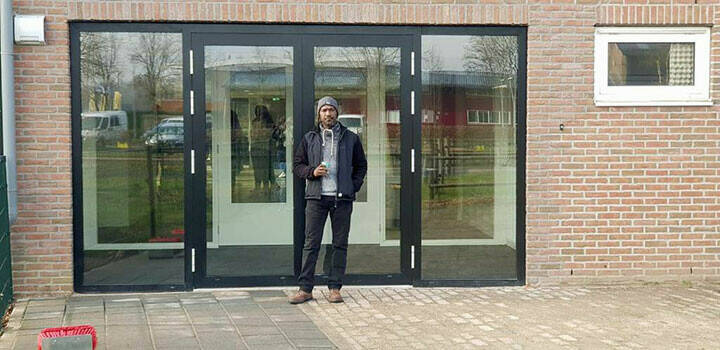
In September 2022 Joackim started his training at Aeres TCI. “It is my first time being away from home for this long and my first time in the Netherlands, but over the past six months I have felt very welcome here.” Joackim is in Barneveld to study the International Poultry Management course. “I work as a trainer to students and sometimes I directly teach and train farmers. I teach management practices involved in animal production. So, I feel lucky that I got the chance to study this course.”
It was almost ten years ago that Joackim first learned about the possibility to study at Aeres TCI. “A friend who did the course and came back to Zambia and shared his experiences. He was so enthusiastic. Later on, I started checking more details and did my research and finally applied.”
Joackim explains that the people involved with the international programme at Aeres have done a great job of welcoming the students. “I was here during the holidays, for example”, he explains. “And while there were no classes and we had a couple of days off, management had really thought of us. For those staying around campus, they had organised all sorts of things to keep us busy. We were taken to see the dikes, the IJsselmeer. We learned about the water management, got a chance to see the canals and the opening of water gates to see the ships coming in. It was very impressive.”
By the time this magazine is published, Joackim is already back home in Zambia. Hopefully, so he says himself, implementing the knowledge he gained during the six months he spent at Aeres TCI. Joackim is a teacher at the Zambia College of Agriculture, where he works as a trainer and practical instructor in animal production.
“Friendly people that are madly obsessed about coffee”, is the way Joackim Mambwe, from Zambia, describes the Dutch. At Aeres Training Centre International he recently followed the course International Poultry Management. He shares his experiences at Aeres and tells us what it is like to study here for half a year.
